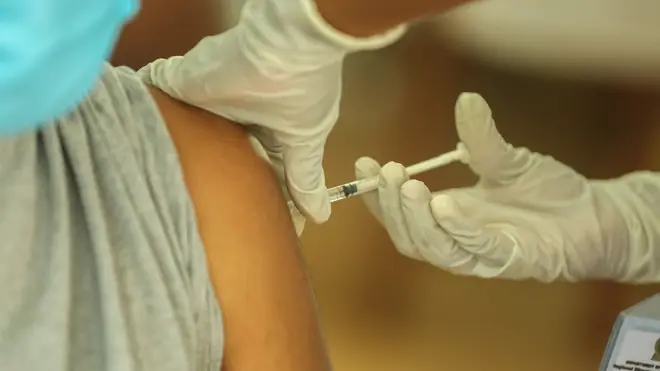
Paul Brand 10am - 12pm
17 June 2021, 00:04 | Updated: 17 June 2021, 00:08

Covid-19 cases are "rising exponentially" across England but the increases are mainly in unvaccinated groups, according to scientists tracking the outbreak.
A study commissioned by the Government, known as the React study, found that infections have increased by 50 per cent between 3 May and 7 June, but scientists say that immunity in the population means the exponential growth may not last.
"Prevalence is increasing exponentially and it is being driven by younger ages,” said Stephen Riley, professor of infectious disease dynamics at Imperial College London, and one of the study authors.
"And it appears to be doubling every 11 days.
"Clearly that is bad news... but the key thing to point out here is that we are in a very different part of the epidemic in the UK and it is very difficult to predict the duration of the exponential phase.
Read more: 'Freedom Day' officially delayed as MPs approve extension of Covid measures
Read more: F***ing hopeless: Cummings leaks 'PM's Whatsapp exchange over Hancock'
"Last autumn and last spring - when we started to observe exponential growth - in some ways it was much more alarming because we knew there was very, very little immunity in the population.
"(But now) because of the vaccination (programme), we know there is a lot of immunity in the population.
"Even though there is a lot of immunity, it does not prevent some exponential growth and that is what we are seeing here."

Gordon Brown on mandatory jabs for care workers
Study author Paul Elliott, director of the React programme and chair in epidemiology and public health medicine at Imperial, also said that the rise in cases was largely being driven by unvaccinated groups.
"I think we can take quite a lot of comfort from the fact that when we look in the details, it does appear that there is very, very good protection in the older ages, where there is virtually everyone double vaccinated,” he said.
"And in the younger group under the age of 65, where a much smaller proportion have been vaccinated or double vaccinated, most infections are occurring in the unvaccinated group.”
Read more: Daniel Morgan's brother tells LBC he feels 'vindicated' after Met Police corruption report
Read more: Man, 57, charged after journalist confronted at anti-lockdown protest
The data from nearly 110,000 swab tests carried out across England between 20 May and 7 June suggests Covid-19 cases are doubling every 11 days, with the highest prevalence in the North West.
It is estimated that one in 670 people are infected.

The figures show the bulk of infections is being driven by children aged between five and 12, as well as younger adults aged between 18 and 24.
Infections in these age groups are around five times higher when compared to those over 65, the researchers said.
The experts from Imperial also said their findings show a "rapid switch" between the Alpha variant, which first appeared in Kent in September 2020, and the Delta variant in the last few weeks, with the latter accounting for up to 90 per cent of all determined variants.
Read more: France lifts Covid curfew after eight months
Read more: UK hits back after Leo Varadkar says he could see united Ireland in his lifetime
The study has also showed that the "weakened link" between infection rates and hospital admissions was "well maintained" for those aged 65 and above, while "the trends converged below the age of 65 years", suggesting the vaccines were “highly effective”.
Professor Riley said: "We have observed this reconvergence in the pattern of hospitalisations and deaths versus infections, especially in an age group under 65.
"These patterns are consistent with two vaccine doses being highly effective."

James O'Brien questions why the PM didn't get rid of Matt Hancock
The scientists said their findings from the React study suggest that imminent expansion of the vaccine programme to those aged 18 and above "should help substantially to reduce the overall growth of the epidemic".
“The Government has clearly announced that they want to vaccinate all adults in the period between now and 19 July, I think that will make a very big difference and increase the total amount of population immunity,” said Mr Elliott.
Read more: Gordon Brown tells LBC: Cummings messages show 'what we all feared - Govt was chaotic'
Read more: Keir Starmer says Boris Johnson was 'tour guide' not statesman at G7 summit
Health and Social Care Secretary Matt Hancock said: "These findings highlight the stark context in which we took the difficult decision to delay Step 4 of the road map out of lockdown.
"Cases are now rising, but thanks to our incredible vaccination programme and enhanced response package including surge testing, we have the tools to curb the spread of this virus.
"We all must hold our nerve that little bit longer as our vaccine rollout continues and I urge everyone to keep observing hands, face, space and fresh air, and make sure you receive both doses of the vaccine for the best possible protection."